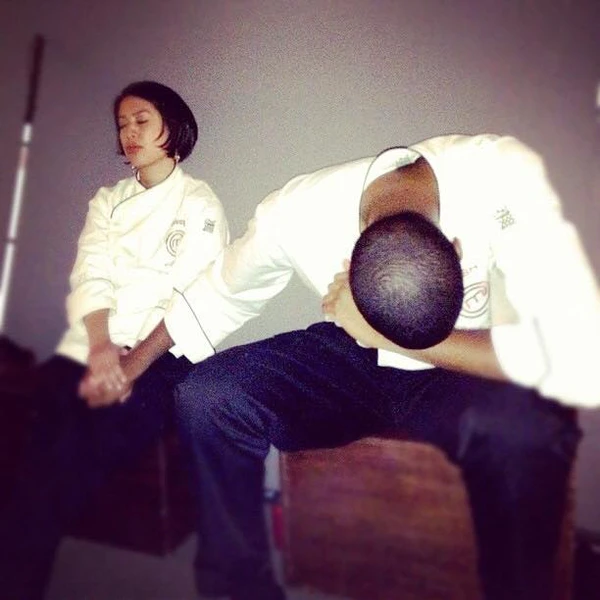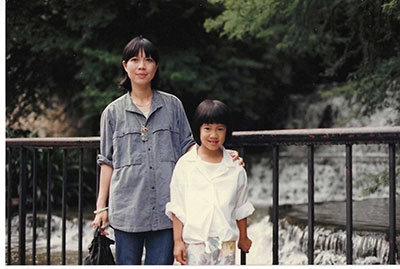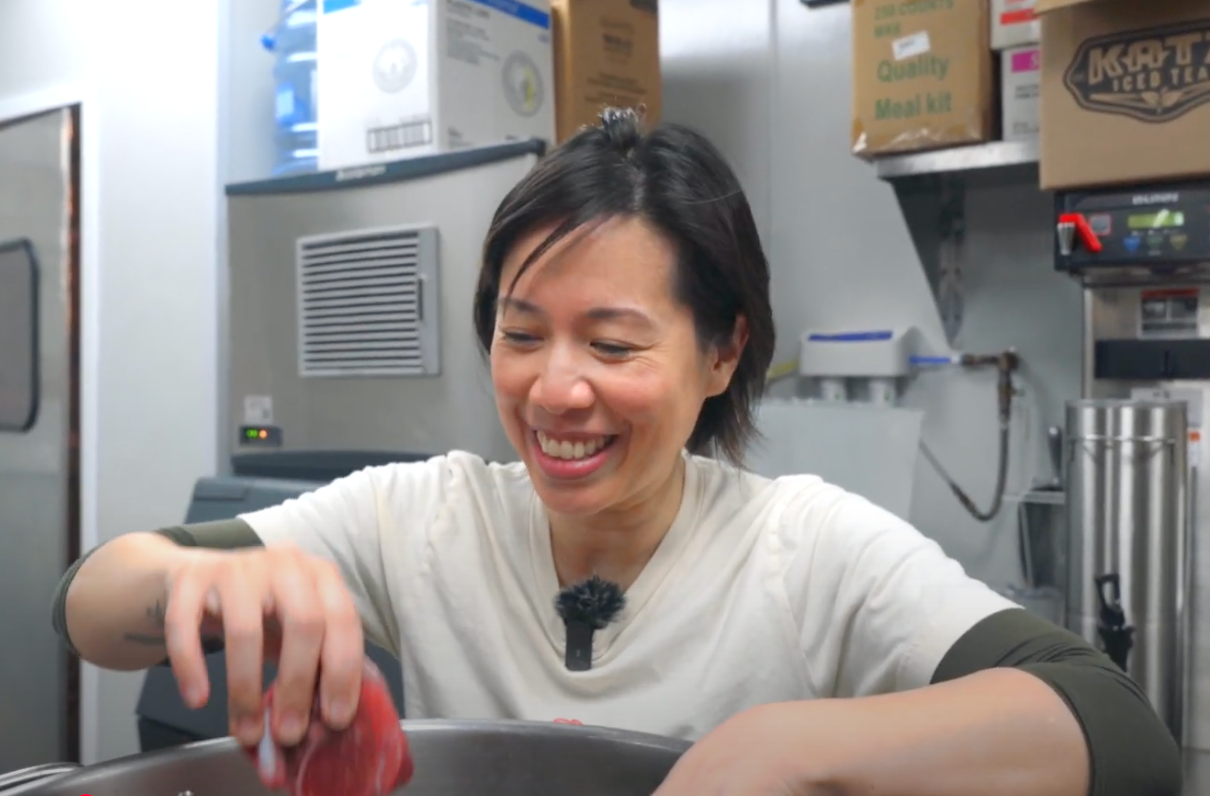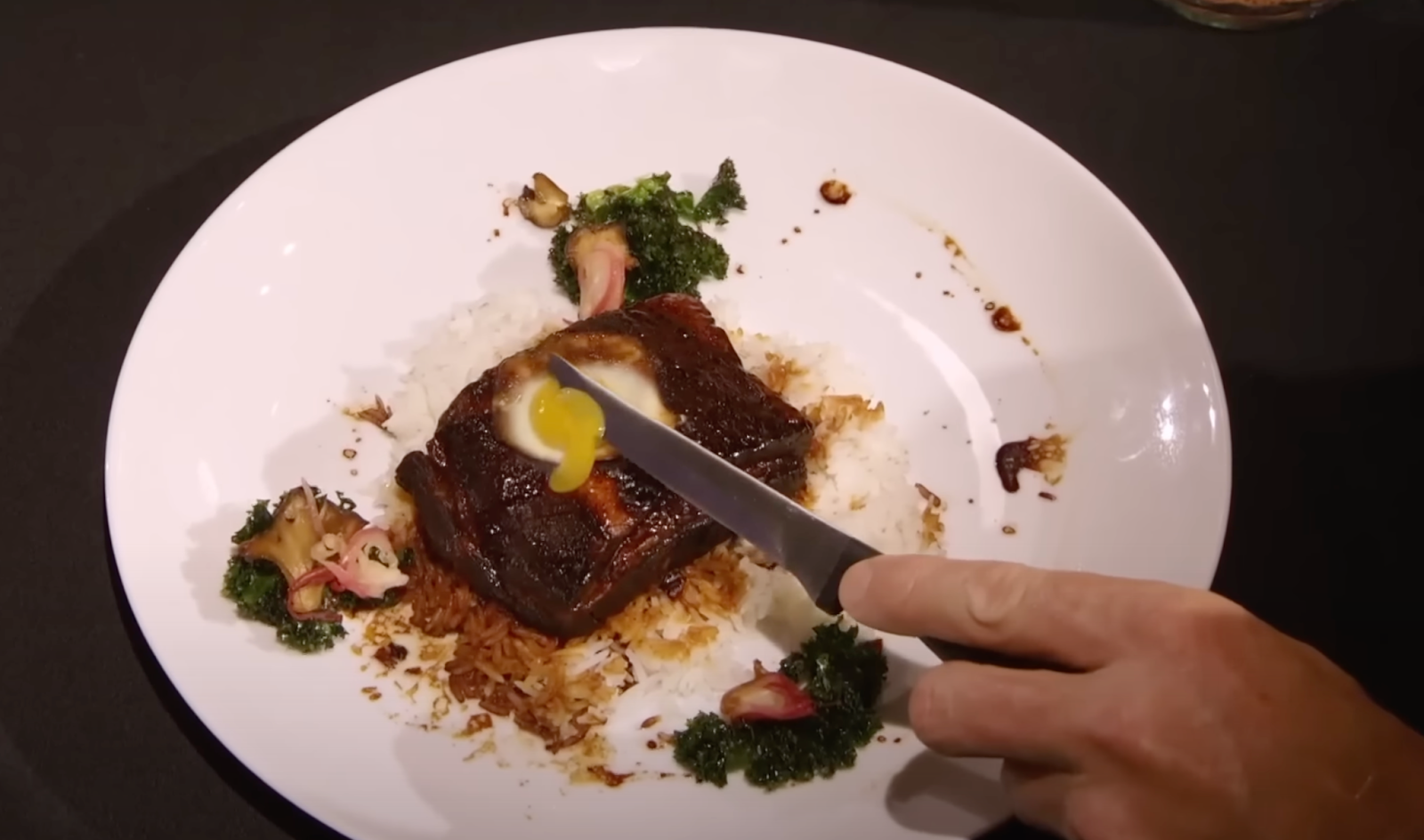Christine Ha won MasterChef US, authored a best-selling cookbook, and opened multiple restaurants. But growing up as a blind Vietnamese American woman meant learning to navigate impostor syndrome, cultural expectations, and the weight of visibility.
When she won Masterchef US season 3, Christine looked like a sparrow next to a lion as she threw her arms around her towering competitor, Joshua Marks, whom she would later memorialize in a tribute following his death by suicide in 2014.
Thirteen years elapsed and Christine still looked the same as she was when I saw her on television, except for a few faint wrinkles. In my memory, she remains a petite blind chef with quiet wit, big bright eyes and shoulder-length black hair.
In a conversation with my senior editor Nga and me, Christine Ha reflected on life after Masterchef, the Viet identity and advocacy for the underrepresented.
Nga: How's the journey looking for you over the past decade?
My life definitely changed after winning Masterchef. That was in 2012, 13 years ago, believe it or not. And since then, I have done a lot.

I currently have two restaurants in Houston. One is The Blind Goat, which is a modern Vietnamese full-service restaurant. In the same parking lot is Stuffed Belly, a smaller drive-thru concept that serves classic American sandwiches with a fun twist.
So we have two concepts right now, and that takes up a lot of our time. I recently announced that I'm signing a deal to work on a second cookbook. And then it's been on and off that we've been filming a documentary project about my life story since 2019.
Nga: How would you describe the narrative of the documentary?
My story is very typical. My parents escaped Vietnam a day before the fall of Saigon. The documentary explores my Asian American identity and how, no matter how much we’ve achieved, we’re feeling like we’re always falling short of something.
My parents made this trek to this country so we could have a better life. It was drilled into my mind that I had to be a doctor. I ended up in business school before pursuing creative writing in grad school. At that point, I was dealing with health issues, and my family just wanted me to be happy.
“It’s kind of balancing the idea of being the typical obedient Vietnamese child and being an American, where you’re being taught to be independent and have a voice.”
Oftentimes I ask myself: Do I know what I'm doing? am I a good business owner? Am I a good restaurant operator? Am I a good chef? Am I a good wife? Am I a good friend? Those kinds of questions frequently barrage my brain.
Nga: You mentioned that the insecurity gets better over time. Is it the American side that makes you more independent?
It got better as I gained more experience. I’ve been operating restaurants for about six years. That doesn’t seem like a lot, but six years is more than six months. I’ve also done a lot more public speaking and realized many experience the same feeling that they don’t have a clue what they’re doing.
It’s human nature to feel that way. Especially women of color feel that anxiety of imposter syndrome. The most important thing is knowing I don’t feel alone in feeling that.
When you gain experience, it builds your confidence, too. I’ve been operating business and cooking longer.
“It’s about realizing I’m not perfect, but I do know a thing or two.”
Nga: Again, about the second cookbook, you mentioned it’s going to be about recipes inspired from memories of mom and grandmother. Is there anything that stands out the most?
So the introduction is sort of a love letter written to my mom. I lost my mom when I was 14 years old. She passed away from cancer and I wish I learned to cook from her. It wasn’t until college that I realized I missed so many of the dishes she cooked. I started teaching myself from memory, reading recipes here and there, trying to change the recipe every bit so it got closer and closer to my mom’s dishes.
I have a picture of both my parents in my kitchen. Whenever I cook, I know they’re looking over me.
My perfect day if my mom were to come back would be going shopping first (smiling) because I know she loves shopping. I would want to show her what Houston looks like now, then end the day with me learning how to make phở.

Nga: Is there anything special about her phở?
It’s biased, and I think everyone will maybe say this about their own moms, but I think her phở was the best. Many of her friends had told her she should open her own phở shop. I feel like she cooks phở kind of in the style of phở Bắc (northern style).
Because both my parents were originally from the North, she used wider noodles, which isn’t very commonly found in Houston. She didn't put a lot of sweetness in her phở. It was pretty simple, but very beefy and full of depth and soul.
And so I've always grown up loving to just eat very simple phở. I prefer just phở tái (phở with rare beef) and then just squeezing lime juice in. And that's it.
Nga: Do you think by opening your own restaurants, it's also about doing what your parents did not get to do?
I've never thought of it that way, but I think you make a good connection.
My opening the Blind Goat is a tribute to my parents and my family, by showing them that the things you made are now being enjoyed in America by all kinds of people, ages, skin colors. They speak different languages in my restaurant. Everyone comes to try what Vietnamese food can be and the creative aspect of it too.

There’s this traditional dish on our menu like bánh khọt, but then there are more creative things like garlic noodles, a Vietnamese American invention. I hope they can see that I’ve taken from them and made it evolve.
So they're still living on through the food that I cook and serve.
Nhat: You mentioned the Asian-American identity. You also go by The Blind Cook on social media. How did you navigate that identity of disability over Masterchef till now?
There are various people with different challenges and disabilities. Many people look to me as someone they can say, oh, she’s also visually impaired, and she was able to do that.
When you find someone that reveals how human they are, you relate to that, and then you think “I can do that too.” They’ve done great things, but they’re also human. They also laugh. They also feel sadness. They also go through pain and suffering.
My disability is just a part of me, but it makes me kind of this interesting character that adds more color and depth to my life, and I'm hoping that that will inspire somebody else, because other people have been able to live their life by example for me.
Nhat: In a Masterchef challenge, you said: “I don’t want to be an inspiration. I want to be taken seriously.” What do you think of it now?
I don't want to knock the fact that I am an inspiration for so many people, because I don't want to discredit what other people feel. But I think in that moment when I was saying that, I felt like a lot of other contestants thought I was just a gimmick. Many of the contestants came and asked me, “how are you going to cook?” or “Who's going to be cooking for you?”. I was kind of shocked.
I know how to hold a knife even though I can't see. I can feel, and I've learned to do it. So I just had no idea there were so many people that thought that.
It started getting into my head. I was thinking all these people must think that I'm not really a true cook. I didn't want to be winning challenges just because I was an inspiration.
“Although my social media handle is The Blind Cook because it’s tongue-in-cheek and funny, I didn't want to be known as a person who is an amazing cook even though they're blind. I just want to be known as an amazing cook.”
Nhat: You cook a lot of Vietnamese food, yet some Western techniques are considered more desirable for a chef to master. What do you think when people consider Vietnamese food something cheaper and simpler?
I just cook with what I have available to me. I'm more familiar with techniques that perhaps aren't used in a lot of family households like using an immersion circulator. It doesn't always matter how you get to your final dish. It's often that final dish that matters most.

Someone who has been cooking for generations, like a Vietnamese grandma can use clay pots and rustic equipment. Her dish can probably turn out better than mine.
Even on MasterChef, I was cooking for the judges who have eaten at all the nicest restaurants in the world. And I hope that they can see my culture and taste my heritage in that bowl or on that plate.
“I asked myself, is this something I'm proud of? And would I want to eat this myself? And then that's what I served them.”
Christine and her husband wanted to return to Vietnam within the next 12 months to explore new culinary developments and potentially “retire part-time” there in the far future. She shares her plan to continue advocating for the underrepresented and the underserved in the global community, be they people of color or people with disability.
Christine Ha received the Hellen Keller Achievement Award in 2014 in honor of her contribution to advocacy for people with vision loss.
It is extraordinary that she won Masterchef, wrote one book and is working on a second and opened multiple restaurants. Her disability did not obstruct her from any of those achievements, it was an integral part of that success.
After all, Christine isn’t an amazing cook despite her disability. She’s an amazing cook with it.
